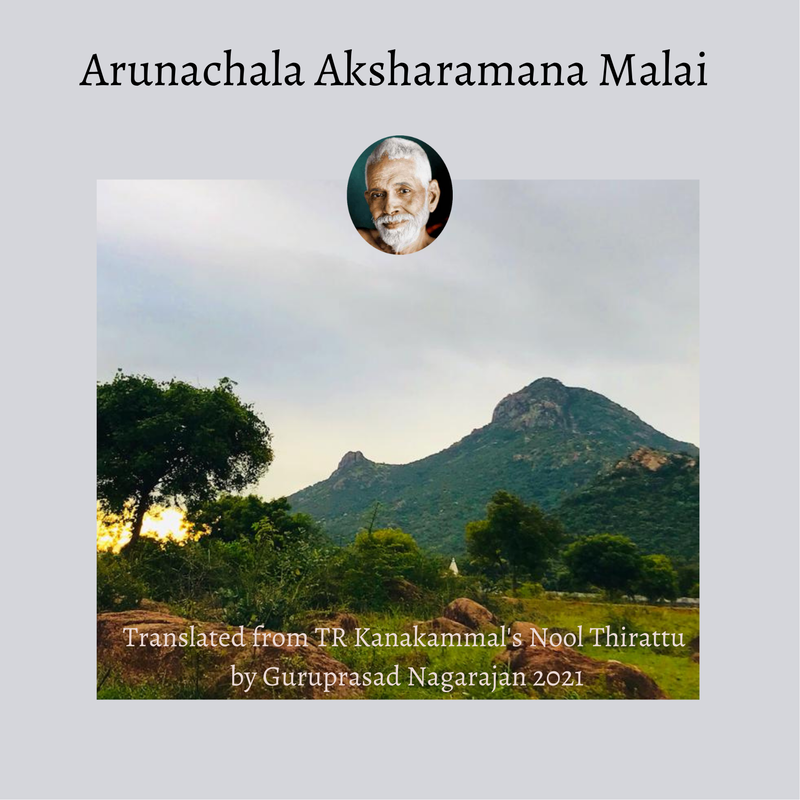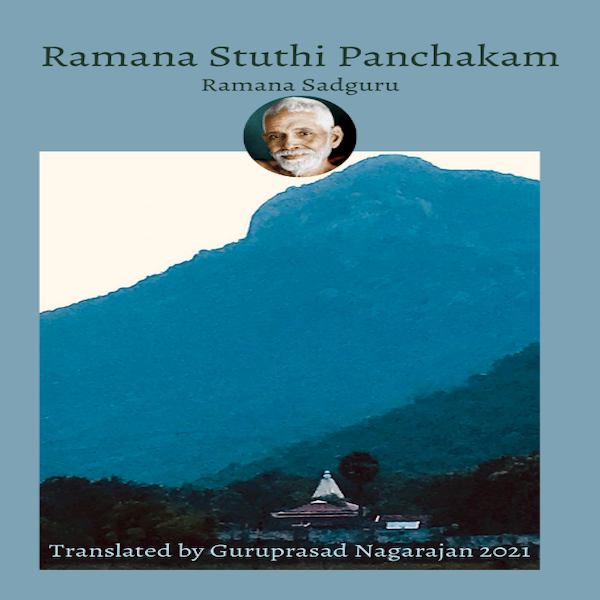SarguNa kadal aana narguNan
Sarchanar pugazh needhiyaan;
Arpudha chuvai yaana paagina
Asiba thath uruvaanavan.
Word meaning
sar guNa, nar guNa = good qualities/charactersitics; Nadal = ocean; sar chanar (sat jana) = good (noble) people; arpudha = wonderful; chuvai (also suvai) = taste; paagu = thick sugar syrup; asiba thathuvam = tat vam asi;
Meaning
Our Ramana is an ocean of noble qualities and flawless characteristics. He is praised and worshipped by those with noble qualities. He is the like the sweetest nectar. He is the form of Tat Vam Asi (You are that), the mahavakya.
Earlier SV compared Bhagavan to be the meaning of all the mahavakyas pronounced in the four vedas, here he declares He is the meaning of Tat Vam Asi, meaning You Are That. We find this in Aksharamanamalai:
42 Thatthuvam theriyaadh athanai utraai
Thatthuvam idhuvenn Arunachala
Meaning
Arunachala! Without knowing the truth ‘You are that’, you helped me attain that state. Shower me with your grace so as to confirm that this is the state I have attained.
Explanation
Bhagavan attained the state of liberation (tat vam asi = you are that, a non dual state where no differences exist), without the traditional guru-sishya (master-disciple) relationship or upadesa on the eternal truth. Bhagavan knew Brahman by the grace of Arunachala at his young age when he did not know either the word Brahman or its meaning.
Console me by confirming that the state bestowed on me is what a disciple achieves after proper initiation and practice, says Bhagavan. Bhagavan appeared on the earth to help jivas attain moksha but he never had any formal initiation in the Maha vaakya, ‘ you are that’. Bhagavan is asking Arunachala shining as Atman swaroopam (self manifested) to confirm the self-realisation experience he had as a young boy.
He is the ocean of all the noble qualities says SV. While at times Bhagavan was seemingly harsh on the devotees (we find examples in Suri Nagamma’s letters), it is only to direct them back to what they came for lest they go astray into unnecessary paths such as pleasing Bhagavan by serving more food or thinking that by bringing presents they can benefit. ‘Vandha velaya paaru’ (attend to the work/job you have come for) was his constant remark to those indulging in activities other than self-enquiry.
Sar-chanar pugazh needhiyan. He is worshipped by noble people. The devotees who streamed from various parts of the world to Bhagavan came from various strata of society. There were doctors, engineers, lawyers, administrators, kings, queens, pundits, scholars, sadhus, yogis and siddhas in the form of animals, not to mentions simple, poor people (to whom Bhagavan showed special concern). Once a great yogi named Achutadasa came to visit Bhagavan when he was in Virupaksha Cave. After singing bhajans he held Bhagavan’s hands and touched his feet. When others who came with him tried to do the same, Achutadasa stopped them saying, ‘This is a big flame, don’t go near it’ (From Kunjuswami’s Enadhu Ninaivugal).
Sarchanar pugazh needhiyaan;
Arpudha chuvai yaana paagina
Asiba thath uruvaanavan.
Word meaning
sar guNa, nar guNa = good qualities/charactersitics; Nadal = ocean; sar chanar (sat jana) = good (noble) people; arpudha = wonderful; chuvai (also suvai) = taste; paagu = thick sugar syrup; asiba thathuvam = tat vam asi;
Meaning
Our Ramana is an ocean of noble qualities and flawless characteristics. He is praised and worshipped by those with noble qualities. He is the like the sweetest nectar. He is the form of Tat Vam Asi (You are that), the mahavakya.
Earlier SV compared Bhagavan to be the meaning of all the mahavakyas pronounced in the four vedas, here he declares He is the meaning of Tat Vam Asi, meaning You Are That. We find this in Aksharamanamalai:
42 Thatthuvam theriyaadh athanai utraai
Thatthuvam idhuvenn Arunachala
Meaning
Arunachala! Without knowing the truth ‘You are that’, you helped me attain that state. Shower me with your grace so as to confirm that this is the state I have attained.
Explanation
Bhagavan attained the state of liberation (tat vam asi = you are that, a non dual state where no differences exist), without the traditional guru-sishya (master-disciple) relationship or upadesa on the eternal truth. Bhagavan knew Brahman by the grace of Arunachala at his young age when he did not know either the word Brahman or its meaning.
Console me by confirming that the state bestowed on me is what a disciple achieves after proper initiation and practice, says Bhagavan. Bhagavan appeared on the earth to help jivas attain moksha but he never had any formal initiation in the Maha vaakya, ‘ you are that’. Bhagavan is asking Arunachala shining as Atman swaroopam (self manifested) to confirm the self-realisation experience he had as a young boy.
He is the ocean of all the noble qualities says SV. While at times Bhagavan was seemingly harsh on the devotees (we find examples in Suri Nagamma’s letters), it is only to direct them back to what they came for lest they go astray into unnecessary paths such as pleasing Bhagavan by serving more food or thinking that by bringing presents they can benefit. ‘Vandha velaya paaru’ (attend to the work/job you have come for) was his constant remark to those indulging in activities other than self-enquiry.
Sar-chanar pugazh needhiyan. He is worshipped by noble people. The devotees who streamed from various parts of the world to Bhagavan came from various strata of society. There were doctors, engineers, lawyers, administrators, kings, queens, pundits, scholars, sadhus, yogis and siddhas in the form of animals, not to mentions simple, poor people (to whom Bhagavan showed special concern). Once a great yogi named Achutadasa came to visit Bhagavan when he was in Virupaksha Cave. After singing bhajans he held Bhagavan’s hands and touched his feet. When others who came with him tried to do the same, Achutadasa stopped them saying, ‘This is a big flame, don’t go near it’ (From Kunjuswami’s Enadhu Ninaivugal).







 RSS Feed
RSS Feed